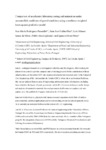Comparison of accelerated laboratory curing and maturation under uncontrolled conditions of gravel emulsions using a nonlinear weighted least-squares predictive model

Ver/Abrir
Use este enlace para citar
http://hdl.handle.net/2183/34204
Excepto si se señala otra cosa, la licencia del ítem se describe como Atribución-NoComercial-SinDerivadas 3.0 España
Colecciones
- Investigación (ETSECCP) [826]
Metadatos
Mostrar el registro completo del ítemTítulo
Comparison of accelerated laboratory curing and maturation under uncontrolled conditions of gravel emulsions using a nonlinear weighted least-squares predictive modelFecha
2022Cita bibliográfica
Rodríguez Pasandín, A. M., Galán-Díaz, J. J., da Silva, L. M. S., Iglesias, P. O., Pérez, I. P. (2022). Comparison of accelerated laboratory curing and maturation under uncontrolled conditions of gravel emulsions using a nonlinear weighted least-squares predictive model. International Journal of Pavement Engineering, 1-11. https://doi.org/10.1080/10298436.2022.2144309
Resumen
[Abstract:] Cold-asphalt mixtures (CAMs) are evolved materials whose mechanical strength increases with their maturation. The relationship between CAM field maturation and laboratory-accelerated cure procedures is not well understood. Furthermore, there is controversy on the recommended methodology for laboratory-accelerated cure. So, in this work, the accelerated curing protocol for a CAM-type gravel emulsion was examined, and its uncontrolled maturation and performance were contrasted. For this, the mixture was subjected to either accelerated curing (from 0 to 7 days in a 50 °C oven) or natural curing (from 0 days to 6 months at 20 3 °C in the laboratory and at an unfixed temperature outside the laboratory). We analysed, as functions of time, the moisture, indirect tensile stiffness modulus (ITSM), and moisture damage resistance. A curing protocol of 2 days at 50 °C yielded ITSM values closer to those obtained under uncontrolled conditions. Nevertheless, total maturation of the mixture was achieved after 3.5 days of curing. The nonlinear weighted least-squares method yielded an expression that better predicted the performance of the gravel emulsion for the first six months of life. The model parameters were easily fitted using ITSM measurements derived from samples cured for 2 days in a 50 °C oven.
Palabras clave
Cold-asphalt mixture
Gravel emulsion
Evolutive material
Uncontrolled maturation
Accelerated curing protocol
Nonlinear weighted least squares
Gravel emulsion
Evolutive material
Uncontrolled maturation
Accelerated curing protocol
Nonlinear weighted least squares
Descripción
Versión aceptada de autora e autores
Versión del editor
Derechos
Atribución-NoComercial-SinDerivadas 3.0 España






